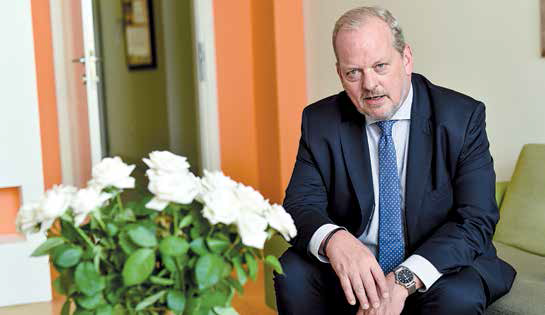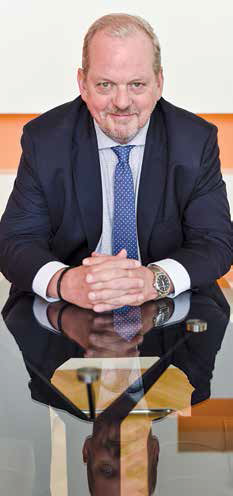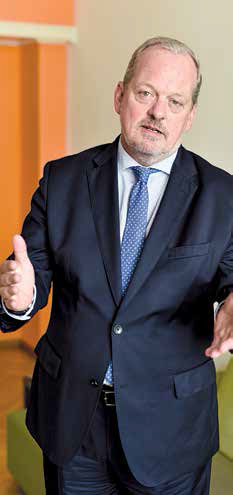The Negotiating Framework clearly states the accession negotiations are determined by progress on the rule of law and fundamental rights chapters, as well as the normalization of Serbia’s relations with Kosovo. The rule of law is not just a condition on paper, but an essential requirement to be able to implement reforms across the board – Hendrik Gerrit Cornelius van den Dool
The recent summit of Heads of State and Government of the European Union confirmed the European perspective of Serbia, considers H.E. Henrik van den Dool, Ambassador of the Netherlands to Serbia, stressing that progress in the negotiation process should not be judged by the number and speed of the opening of negotiation chapters, but rather by the number of those chapters that are closed following confirmation of the achieving of a European standard in that area.
In assessing a country’s success in attaining these standards, the rule of law is particularly important for the Netherlands, or the successful implementation of laws and not just their adoption.
In this interview for CorD Magazine, he evaluates economic relations between the Netherlands and Serbia as having never been better, which is evidenced by the almost 500 million euros of direct investments of Dutch companies in the Serbian economy in 2017 alone.
Ambassador Van den Dool illustrates the situation by noting that, thanks to Dutch company Heineken, which recently celebrated the 10th anniversary of its operations in Serbia, Zaječar’s traditional beer was brought back from oblivion and is again being produced.
Your Excellency, how would you assess the messages of the latest European Summit (28th-29th June)?
The European Council Summit focused on migration, and heads of governments reached an agreement on this topic.

The EU is taking a comprehensive approach that combines more effective control of the EU’s external borders, increased external action, such as support for socio-economic transformation in Africa, and internal arrangements to set up centres in member states. The Netherlands believes that this agreement is an important first step in achieving a joint European and all-inclusive approach to this urgent issue.
The heads of governments also endorsed the conclusions on enlargement adopted earlier that week by the General Affairs Council, which reaffirmed the EU’s unequivocal commitment to the European perspective of Serbia. Ministers welcomed the overall progress achieved, but also urged Serbia to step up its efforts in the area of the rule of law. I believe it is also crucial that the Council called upon Serbia to communicate more actively regarding its strategic choice for the EU.
It was confirmed at the Summit that Serbia is opening two new chapters in accession negotiations with the EU. However, Serbia’s negotiating team has stated several times that Serbia is ready to open five chapters. Could the process of opening chapters progress faster?
The opening of two chapters shows that progress is being made. That said, the process of EU integration is not about the speed and the number of chapters, but rather their quality. This involves establishing a sustainable and tangible track record of effective implementation of reforms. This will help Serbia close chapters, which is even more important than opening them.
Media have cited diplomatic sources in reporting the view that the reason for the slower opening of chapters is dissatisfaction among EU countries with progress on the rule of law and reforms being implemented in Serbia. Given that this is undoubtedly an important issue for the Netherlands, what is your country’s stance on the situation in this area?
The Negotiating Framework clearly states that the overall pace of accession negotiations is determined by progress on chapters covering the rule of law and fundamental rights, as well as the normalisation of Serbia’s relations with Kosovo. The rule of law is not just a condition on paper, but an essential requirement to be able to implement reforms across the board. Therefore, we have noted with concern the lack of progress in certain areas, especially on media freedom.
The opening of two chapters shows that progress is being made. That said, the process of EU integration is not about the speed and the quantity of chapters, but rather their quality
The migrant crisis is again a major topic in the EU, also with the question of the possible additional closing of the EU’s borders more firmly, which is insisted upon by individual members, but also part of Germany’s ruling coalition. What is the position of the Netherlands on this issue?
For the Netherlands, it is of utmost importance that we keep working together, as the EU, to find common solutions to this important issue. The mobility of people within the EU is one of the foundations of our Union, so we need to address this together.
It is essential to take a comprehensive approach, so, not only ensuring more effective control of the external borders, as you point out, but also addressing the root causes by promoting economic development and good governance in countries of origin. It also has an internal dimension, which includes working towards a Common European Asylum System and promoting the integration of those who need protection.
Would the Netherlands support Austrian Chancellor Sebastian Kurtz’s idea to build camps for the long-term accommodating of migrants that would be located outside of the EU; and where do you think those centres could be situated?
External engagement is one of the elements of the agreement that the European Council concluded in June. The precise details will still have to be worked out, so it is good that the Austrian presidency of the Council has made migration one of its priorities. For now, there is an agreement on controlled reception centres within EU member states on a voluntary basis. Outside the EU, we will step up our cooperation with countries of origin and transit. Given current migration flows, the immediate focus of efforts to improve reception conditions is along Eastern and Western Mediterranean routes.
How does the Netherlands view the French President’s proposals on essential reforms within the EU that would imply, among other things, the establishment of a special budget for countries that are part of the eurozone? In your opinion, what should be the key elements of reforms?
It is evident that there is a need to reform the EU in certain areas, to make it more resilient to the challenges we have seen emerge in recent times. 
The EU is the most successful example in the world history of how multilateralism and the willingness to compromise can bring about unprecedented security, stability and prosperity and, as a founding member, the Netherlands is committed to ensuring that the Union stays strong.
The choice facing member states now regards the way in which the course will be set for the future, and it is good that President Macron and others have shown initiative by presenting proposals on what that future could look like. It is important, however, that decisions are made rationally, proportionally and in deliberation with all those involved, so as to ensure that reforms add value where value can be added while being cautious about far-reaching transfers of competence to the European level as a default response to challenges.
The position of the Netherlands in these discussions, therefore, is that, as our Prime Minister stated recently in the European Parliament, “the debate about the future of the EU should not be about more or less Europe. It should be about where the EU can add value and where sovereign member states can make a positive and conscious choice to work together.”
I think that Heineken’s success here, as well as that of other Dutch companies operating in Serbia– such as Philips, KupujemProdajem, Vahali, Ahold-Delhaize and many others – is a sign that Serbia is a place where Dutch companies can thrive
What will be the consequences of the so-called mini customs war between the U.S. and the EU for the economy of the Netherlands?
The relationship between the Netherlands and the U.S. dates back over four centuries and is one of our key partnerships in many sectors, ranging from security to economic cooperation. This will also remain the case in the time to come. This was reaffirmed during Prime Minister Rutte’s visit to Washington just recently, where our economic relationship was one of the issues the Prime Minister discussed with President Trump.
Dutch investments have created around 825,000 jobs in the U.S., while over a quarter of a million jobs in the Netherlands are the result of U.S. investments in the Netherlands, and there is significant potential for those numbers to increase. In terms of our bilateral trade, the U.S. currently maintains a trade surplus with the Netherlands. In that sense, I think it is clear that it is in everyone’s best interest for EU-U.S. relations to continue to be based on the principles of open and free trade.
When it comes to economic cooperation between the Netherlands and Serbia, do you have the impression that it is stagnating – compared to 2013, for example, when was the Netherlands, the largest investor in Serbia?
Quite the contrary, economic cooperation between our two countries is stronger than ever. When compared to 2013, the total value of bilateral trade has increased by ca. 25 per cent, and it was over 600 million euros in 2017. As far as foreign direct investment is concerned, it is true that the Netherlands was the biggest source of FDI in 2013, but according to the NBS, Serbia’s central bank, that was also the case in 2014, 2015, 2016 and 2017. FDI from the Netherlands reached almost half a billion euros last year, which is 30 per cent more than in 2013. I am confident that we will also maintain that position in 2018.
In terms of business development, we also notice a trend of an increasing amount of Dutch companies showing interest in entering the Serbian market in a variety of sectors, ranging from agriculture and IT to renewable energy and others. Those companies that are already well-established investors in Serbia plan to stay and expand. Actually, quite the opposite of stagnation, our economic relationship is becoming stronger and more dynamic!
Explaining the secret of the success of Dutch agriculture recently, you spoke about the significance of the “golden triangle”– the state, the private sector and the academic community – in this business. Do you have the impression that you can transfer this know-how to Serbia?
The Netherlands is well known for its intersectoral cooperation. The Dutch must cooperate in order to survive and cope with low lands and high water and tides, and this attitude extends to all sectors of the economy.
 The Netherlands has a unique approach in the agriculture sector that we refer to as the “golden triangle”. It represents specific cooperation between agriculture businesses (farmers), the academic community and the government.
The Netherlands has a unique approach in the agriculture sector that we refer to as the “golden triangle”. It represents specific cooperation between agriculture businesses (farmers), the academic community and the government.
Farmers are organised in cooperatives, through which they strive for better conditions on the market, decreasing their production costs and increasing their profit. By organising themselves in such a way, farmers make themselves material “sparring partners”.
Cooperation in the agriculture sector includes all stakeholders: farmers/producers, educational and training centres, universities, logistical centres, distributors, government, civil society and consumers.
On the other hand, the Netherlands is very keen on having the public debate on different policy issues, in order to keep everybody informed and able to anticipate what is going to happen. That way, everyone can prepare for the coming changes while ensuring a good atmosphere for doing business.
The Embassy of the Kingdom of the Netherlands promotes this approach through all activities: seminars, workshops, technical lectures, joint business presentations at the Novi Sad Agriculture Fair etc. We are trying to present our way of working to our Serbian counterparts and interest them in trying the same or a similar approach for coping with the challenges they face.
Freedom of expression and freedom of media are issues of high priority for the Netherlands and, apart from closely following the situation in Serbia and in Montenegro, we also support projects contributing to the creation of better conditions for freedom of expression
Famous Dutch brand Heineken recently commemorated the tenth anniversary of its arrival in Serbia with celebrations in Zaječar. How would you evaluate the impact of this investment and what kind of message about Serbia does it send to the Dutch business community?
I was very glad that Prime Minister Brnabić, Minister Ðorđević and I had the opportunity to visit the brewery in Zaječar on the occasion of Heineken’s 10th anniversary of operations in Serbia. Heineken is one of the best-known Dutch brands worldwide. Apart from being an excellent brewer, Heineken has a track record for being a responsible and modern Dutch employer that invests strongly in its workforce, in culture and in the local communities where its operations and upon which it relies.
That’s why I’m particularly glad it has such a substantial presence in Serbia, successfully operating two breweries and having invested over €200 million. Simply put, the impact of Heineken is evident when you order Zaječarsko pivo. Having almost disappeared, this excellent beer is now the most popular beer in Serbia, and that is because Heineken managed to combine Serbian craftsmanship, artisanal know-how and love for tradition with Dutch innovation, modern (brewing) technologies and business practices.
I think that Heineken’s success here, as well as that of other Dutch companies – such as Philips, KupujemProdajem, Vahali, Ahold-Delhaize and many others – is a sign that Serbia is a place where Dutch companies can thrive.
The latest report for the European Parliament reiterated concerns over the state of the media in Serbia. Do you share the view that the situation is unsatisfactory?
A lot of work needs to be done in the area of media freedom. This was reiterated in the latest European Parliament report, as you noticed, but was also evident in Serbia falling in the rankings of some important indicators, such as the World Press Freedom Index and the Freedom House Report. Of many media-related issues, the safety of journalists is the most concerning.
The timely processing and sentencing of perpetrators for all verbal and physical attacks are crucial. One of the hot topics at the moment is the Media Strategy and, even though it should already have been in place some time ago, recent developments regarding its drafting are positive.
However, the implementation of existing laws and this future Media Strategy need to be monitored closely.
Freedom of expression and freedom of media are issues of high priority for the Netherlands and, apart from closely following the situation in Serbia and Montenegro, we also support projects contributing to the creation of better conditions for freedom of expression.
| LAW
The rule of law is not just a condition on paper, but an essential requirement to be able to implement reforms across the board |
REFORM
It is evident that there is a need to reform the EU in certain areas, to make it more resilient to the challenges we have seen emerge in recent times |
COOPERATION
The relationship between the Netherlands and the U.S. dates back over four centuries and is one of our key partnerships in many sectors, ranging from security to economic cooperation |
|---|